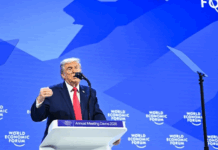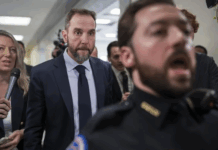You might want to brace yourself for this one, because what just came out of a Florida courtroom feels less like justice and more like a slow-motion tug‑of‑war over secrets nobody seems willing to fully expose.
A federal judge—an Obama appointee, no less—just slammed the brakes on President Trump’s Department of Justice, refusing to release the grand jury transcripts tied to none other than Jeffrey Epstein. Yes, that Jeffrey Epstein. The one whose name still sends a jolt through the news cycle every time it appears.
Here’s the jaw‑dropper. U.S. District Judge Robin L. Rosenberg issued a 12-page opinion basically saying, “Sorry, can’t do it. Hands tied.” And she didn’t just whisper it—she laid it out plainly that Eleventh Circuit law blocks her from unsealing those records, even though the Trump administration made the request directly through Attorney General Pam Bondi. Let that sink in. A sitting president pushing for more sunlight on one of the darkest scandals in recent memory, and a federal judge slamming the door shut with a shrug and a citation of precedent.
JUST IN: Obama appointed federal judge Robin L. Rosenberg in Florida has DENIED the DOJ’s request to unseal Epstein grand jury files.
From the NYT: Judge Robin L. Rosenberg wrote that the court’s “hands are tied.” The government had not requested the grand jury’s findings for… pic.twitter.com/VDLHpyf2Wh
— Charlie Kirk (@charliekirk11) July 23, 2025
The opinion spelled it out: grand jury secrecy rules are ironclad, and the Justice Department didn’t make a strong enough case to override them. But here’s where it gets interesting—this isn’t the end of the line. Not by a long shot. The DOJ has filed three separate requests across Florida and New York, all aimed at prying open records that could answer the questions the public has been asking for years. Who else was involved? What’s buried in those sealed files? And why are so many powerful names still hovering in the shadows?
And just when you think you’ve got a clear narrative, another layer drops. The DOJ isn’t trying to bury this. Quite the opposite. Bondi herself has been under fire after saying she had Epstein’s client list “on her desk,” only to later clarify she meant the files, not an actual list of names. Imagine the pressure—Republican lawmakers, Trump’s own base, and an angry public demanding answers, while every motion runs headfirst into a legal brick wall built decades ago to keep grand jury rooms sealed tight.
BREAKING: Robin L. Rosenberg, an Obama-appointed U.S. District Judge, just REJECTED the DOJ’s request to unseal the Epstein grand jury transcripts pic.twitter.com/doETqU45CN
— Libs of TikTok (@libsoftiktok) July 23, 2025
Then there’s Ghislaine Maxwell. Yes, the co-conspirator whose name has been whispered in every corridor of speculation. The DOJ is pressing her too. Deputy Attorney General Todd Blanche is reportedly set to meet with her, probing whether she’ll finally cough up the kind of details that could shatter the carefully built fortress around Epstein’s secrets. Blanche went on record saying if Maxwell has information, they’re ready to hear it. That alone should make you wonder how much more there is—and who’s terrified of it coming out.
And if you think Congress is sitting this out, think again. House Republicans just voted to subpoena Maxwell for a deposition. Speaker Mike Johnson is telling everyone to give the administration “space,” but with the August recess approaching, the window for action is narrowing.
So here we are, teetering on the edge of revelations that could rock institutions, with a judge’s gavel slamming down and leaving everyone hanging. What’s in those transcripts? Why is the fight for transparency turning into a legal chess match? The clock is ticking, the players are moving, and the stakes couldn’t be higher. Stay tuned—this isn’t over. Not even close.







